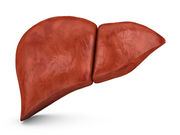Reduction in body weight and portal pressure with 16-week intervention in compensated cirrhosis
WEDNESDAY, Jan. 4, 2017 (HealthDay News) — For overweight/obese patients with compensated cirrhosis and portal hypertension, a lifestyle intervention can reduce body weight and portal pressure, according to a study published online Dec. 20 in Hepatology.
Annalisa Berzigotti, M.D., from the Instituto de Salud Carlos III in Madrid, and colleagues conducted a multicentric uncontrolled pilot study involving patients with compensated cirrhosis, portal hypertension (hepatic venous pressure gradient [HVPG] ≥6 mm Hg), and body mass index (BMI) of ≥26 kg/m² in an intensive 16-week lifestyle intervention program. Before and after the intervention, they measured HVPG, body weight and composition, adipokines, health-related quality-of-life, and safety data. Fifty patients completed the study.
The researchers observed a significant decrease in body weight with the lifestyle intervention, by ≥5 percent in 52 percent and ≥10 percent in 16 percent. There was also a significant decrease in HVPG, by ≥10 percent in 42 percent and ≥20 percent in 24 percent. There was a correlation between a ≥10 percent body weight loss and a greater decrease in HVPG (P = 0.024). There were no episodes of clinical decompensation. Weight loss at 16 weeks persisted at six months.
“Sixteen weeks of diet and moderate exercise were safe and reduced body weight and portal pressure in overweight/obese patients with cirrhosis and portal hypertension,” the authors write.
Full Text (subscription or payment may be required)
Copyright © 2017 HealthDay. All rights reserved.








